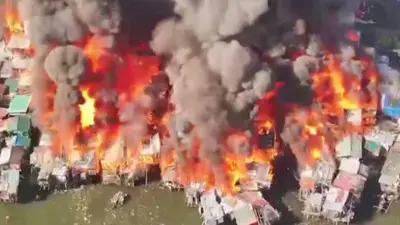We've updated our Privacy and Cookies Policy
We've made some important changes to our Privacy and Cookies Policy and we want you to know what this means for you and your data.
Boko Haram kills 37 in Nigeria's Yobe state - police
Image source, Boko Haram
- Author, Gloria Aradi
- Role, ┤¾¤¾┤½├¢ News
Militant Islamist group Boko Haram has killed 20 mourners returning from the burial of victims of an earlier attack by the jihadists in north-eastern Nigeria, police say.
The mourners died after their vehicle drove over an explosive device planted by the insurgents in Yobe state.
On Monday, the militants shot dead 17 people in a raid on Gurokayeya village.
Boko Haram orchestrated the attacks after the villagers refused to pay a so-called harvest tax, police said.
The militants have frequently been accused of extorting payments from residents in north-eastern Nigeria to fund their operations and to exert control over communities.
"This is one of the most horrific attacks by Boko Haram in recent times. For a burial group to be attacked shortly after the loss of their loved ones is beyond horrific," resident Idris Geidam told the Associated Press news agency.
Yobe police spokesman Dungus Abdulkarim said that 10 members of the burial group died on the spot while another 10 died at a health centre where they were rushed to for treatment.
The incident occurred on Tuesday - a day after the deadly raid on Gurokayeya village.
The attacks are the first major assault that Boko Haram has waged in Yobe in more than a year.
State authorities said they suspected that the militants had arrived from neighbouring Borno state, where Boko Haram has carried out several attacks against civilians this year.
Much of Borno, the birthplace of Boko Haram, is still considered too dangerous to travel by road.
The group launched its insurgency in 2009, with aid agencies reporting that more than two million people have been displaced in the conflict.
The militant group has also extended its reach into neighbouring Niger, Chad and Cameroon, with government forces failing to defeat the group.
Boko Haram means "Western education is forbidden", and it has repeatedly targeted secular schools as part of its attempts to establish its version of Islamic rule in the region.
The group gained notoriety internationally when it kidnapped more than 200 school girls from the north-eastern town of Chibok in 2014.
Top Stories
More to explore
Most read
Content is not available








